When Hannah Moloney was approached by a publisher and asked to write a book, her initial answer was a polite “no, thanks for asking, but I’m not a writer”.
The 38-year-old sustainability queen, who runs Good Life Permaculture in Hobart, had been making a series of “crisis gardening” videos for her YouTube channel to help people grow their own food during the coronavirus pandemic. And those videos captured the attention of Affirm Press.
“I was approached by a publishing company because they found me on YouTube,’’ Moloney explains.
“They said ‘Hannah, we love this so much’.
“At the beginning of Covid people were so scared, they were saying ‘we don’t know how to grow food, there’s no fresh food in shops, what do we do?’ so the videos were in response to that.
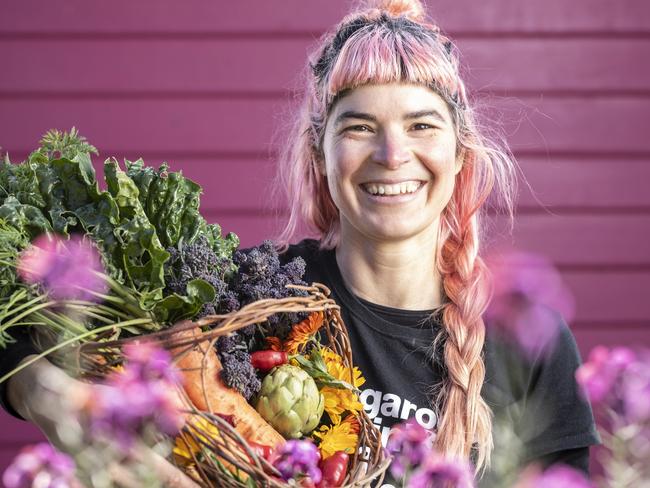
“But it never occurred to me that I could write a book.’’
Initially Moloney turned down the publishing deal, but then had a change of heart.
“It took some convincing actually,’’ says Moloney, who is well recognised from her guest appearances on ABC-TV show Gardening Australia.
“I said ‘oh, no – thanks for asking – but I’m not a writer.’’
“But in the end I was really stoked to say ‘yes’.’’
Moloney saw the book, aptly titled The Good Life: How to Grow a Better World, as a way to raise awareness about climate change, moving the conversation away from the traditional “doom and gloom”-style approach that is often taken and instead arming everyday people with practical advice to help them lead a more sustainable lifestyle.
And the glossy publication, which brims with colourful images taken on Moloney’s South Hobart property, isn’t just for people who live on hobby farms or have generous-sized backyards.
She also offers practical advice for people who only have a small balcony or no outdoor space at all, with tips on everything from keeping chickens and bees and creating compost and worm farms, to making your own yoghurt and car pooling.
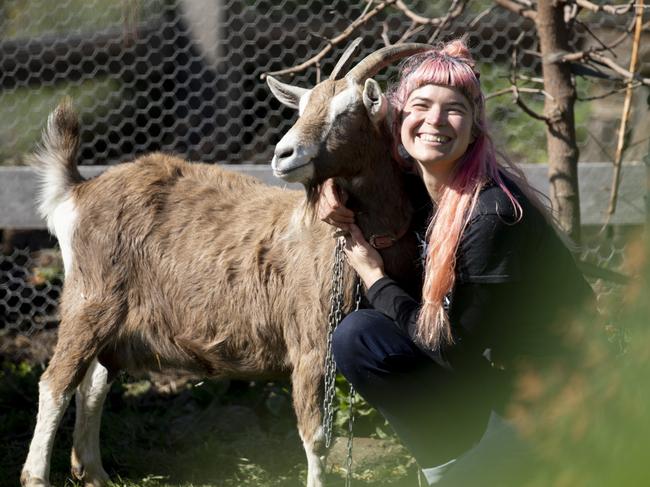
Moloney is a big believer that everyday, ordinary efforts can deliver extraordinary outcomes.
And she says in the wake of recent bushfires, floods and the pandemic, there’s been a significant increase in Australians making genuine life changes to have a better impact on the world around them.
Her aim for the book was to deliver all the skills, self-reliance and confidence needed for people to engage meaningfully with their space, their food and their community. A tome for improving the wellbeing of her readers and everyone around them, to create a better world for all.
“No one can do everything, but everyone can do something,’’ Moloney explains of making small but effective lifestyle changes.
Figures from last year’s Australia Talks survey show that 72 per cent of Australians rate climate change as a problem for them personally.
And many people feel that Australia is not doing enough to address climate change, but also admit they are unsure about how to play their part in making a positive difference.
Meanwhile, a Sustain Australia survey shows home food production has increased since the pandemic, with more than a third of Australians now growing up to 30 per cent of their own food, and one in five Australians saying they could not have made it through the pandemic without their garden.
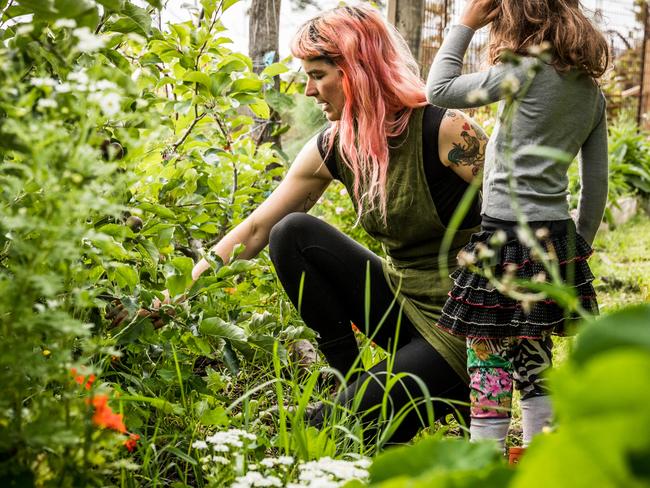
Add to that the fact that gardens have substantial mental health benefits, help to create greener cities, reduce household waste, strengthen community connectedness, enhance food security and encourage fresh produce consumption, and it’s no wonder so many of us are looking for new ways to live in a happier and more sustainable way.
“When it comes to the climate emergency,” Moloney says, “we’re surrounded by bad news.
“According to climate science, our trajectory doesn’t look good for a climate-safe/just future.
“The current political climate and lack of industry leadership also isn’t helping.
“But I believe we can turn this around with a touch of radical hope and by reminding ourselves of our individual and collective power – in our homes, communities, workplaces, polling booths and more.”
Moloney wrote the book during lockdown and in the months that followed. She says it was a hectic time for her family – she juggled writing while she and husband Anton Vikstrom were also tending to their ¾ acre property and running their permaculture business which thrived during the pandemic.
“We were lucky in a sense,’’ Moloney says.
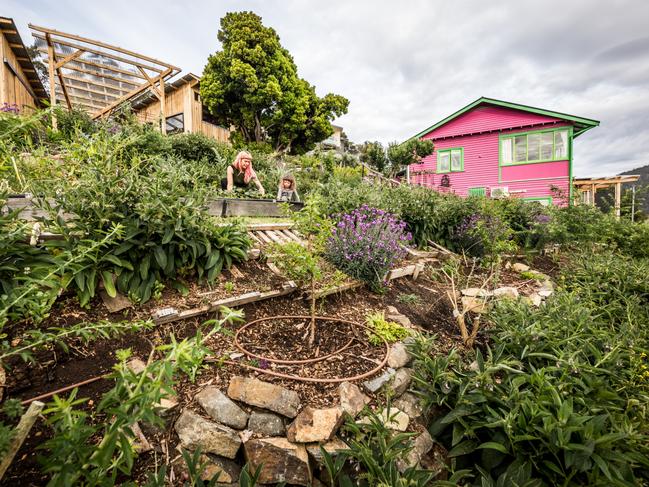
“We have always worked from home, so the business didn’t skip a beat; if anything the business got busier.
“It was a luxury to be writing the book and to be able to have time to think about a better world, because it was seemingly crumbling around us in every shape and form. It was a really interesting outlet to consolidate my ideas from the last 20 years.
“I had four months to write the book and I just did it. In hindsight I should maybe have asked for a bit longer. But I did it, it was great – there were a lot of early morning starts at 4am to try and squeeze it in around our already busy schedule.’’
The book offers an insight into the life of Moloney and the property she owns – which is complete with a hot-pink house to match Moloney’s pink hair and is also teeming with goats, ducks, chooks, bees, rabbits, vegetables, herbs, flowers and fruit trees.
It also follows the journey of how she and Vikstrom met, the role their six-year-old daughter Frida plays in keeping the property running, as well as the effort involved in transforming their once-neglected property into the thriving “small city farm” it is today, with beautiful images captured by local photographer Natalie Mendham.
The sprawling property is the perfect retreat for Moloney, who grew up on her family’s urban herb farm in Queensland.
As a two-year-old Moloney would play in the garden as her dad worked nearby, and as she got older she helped tend to plants in the nursery and built cubby houses among the mango and macadamia trees with her four older siblings. It gave her inside knowledge about farming and gardening and an appreciation for food.
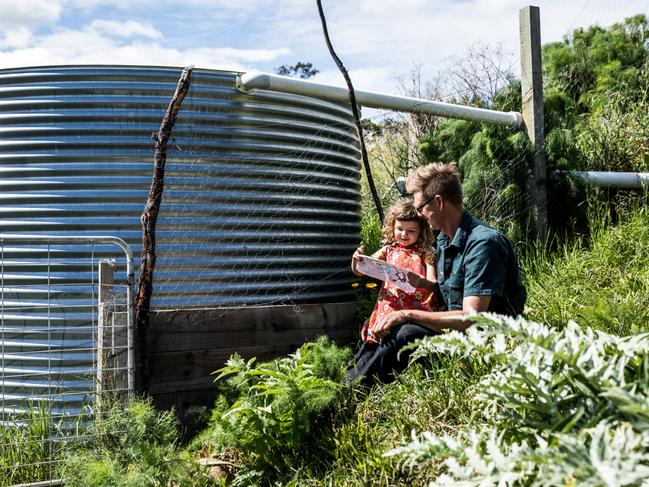
But by the time Moloney hit 18 she decided she’d had enough of the “full-on” 24/7 lifestyle of farming more than 300 varieties of herbs and swore she’d never work on a farm again.
“I was over herb nurseries, I thought ‘this sucks, it’s so much work’,’’ she recalls.
But within months of leaving in search of adventure, she realised she missed it. Permaculture was her passion.
“I think a lot of young people can relate to that need to find your own way and making your own way in life,’’ she says.
Moloney travelled Australia, establishing a name for herself as a teacher, designer, business owner and compost queen.
She spent two months in Africa working on programs supporting farming women in Tanzania and Uganda, and travelled to the Solomon Islands to teach permaculture. She credits her parents for instilling a strong sense of justice in her when it comes to social and environmental politics.
In 2012, Moloney and Vikstrom moved to Tasmania, inspired by the state’s amazing natural resources and its “not too big, not too small’’ feel. They started their business the following year, looking at ways to make landscapes resilient and regenerative.
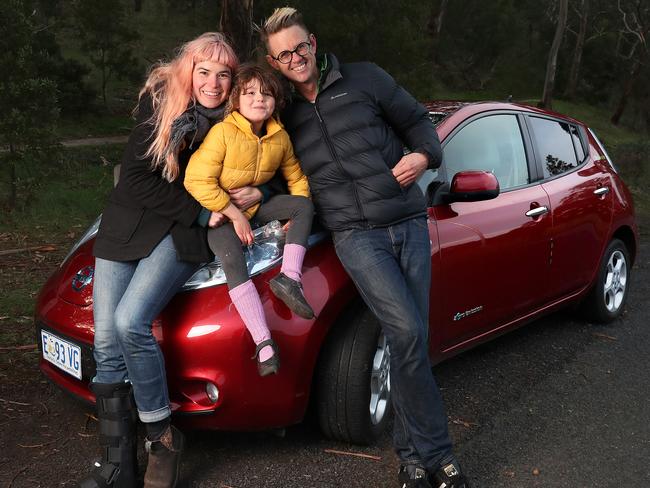
Moloney runs workshops around Tasmania on everything from establishing a permaculture garden and growing food to beekeeping, brewing beer and creating compost.
Despite moving here almost a decade ago, Moloney says her first visit to Tasmania was actually long before that.
“I first came here when I was 18,’’ she recalls. “So almost 20 years ago. I was on a holiday, riding a bike with my then-boyfriend, getting really involved in the forest campaign.
“I knew it was a special island and I wanted to be part of looking after that.’’
Although she returned to the mainland, working in various parts of Australia, Moloney regularly visited Tasmania before finally making the move here permanently.
“Tassie was always the end game for me,’’ she confesses.
She and Vikstrom initially bought a ¼ acre block at South Hobart but later purchased an adjoining property taking it to the ¾ acre it is today.
Although they have done a huge amount of work on the property, Moloney says in many ways it still feels like “we’re just getting started’’ as there’s always so much more to do.

She enjoys sharing her knowledge with others, in fact she feels she has a responsibility to do so. She hopes her book will enable her to reach a new, wider audience and help spread the sustainability messages she’s passionate about far and wide.
Moloney already has 60,000 followers on Instagram, reaching an audience across the globe.
She was initially reluctant to embrace social media, but has been pleasantly surprised by the outcome.
“I only joined social media because a friend forced me to,’’ Moloney laughs.
“I mostly just ignored it for a long time. But obviously that’s the way our world is headed, so I’ve fully embraced it and it has been incredible – it has been amazing to create an online community and to see that you can have a bigger impact towards good because of your engagement with more people.’’
Add to that her YouTube videos, her guest appearances on Gardening Australia (which she says is “such a wonderful community to be a part of’’) and now a new book to share her message, and Moloney is feeling a bit mind-blown by all the attention. She says her younger self would be amazed, but also very proud of her achievements.
“When I was 18 I didn’t even have the internet, I think I had an email address that I checked every three weeks,’’ she laughs.
“I think a younger me would be stoked to know that I’m having more impact.
“(Social media) is very much an incredible way to have a broader conversation. The ripple effect you start seeing is always heartening.’’

till, she admits that putting herself out there, in a book about her own life, has certainly been daunting.
“I hadn’t realised how vulnerable being an author is,’’ confesses Moloney, who introduces herself at the beginning of the book as someone who is “six foot one, laughs randomly with no warning, often has pink hair, cries easily, will eat one to five carrots most days, is fuelled by radical hope and loves gardening, bikes and goats so much that she’s tattooed them on to her body’’.
“Artists create this huge body of work and put it out into the world and just have to cross their fingers and hope people respond well,’’ she says.
“But personally I’m really happy with it.
“At the end of the day you just have to make sure you’re proud to stand by it and put your name to it.
“I focus on having good integrity and being really authentic. But it’s still nerve-racking.’’
Moloney calms those nerves by spending time in nature, often wandering the trails of kunanyi/Mt Wellington.
“My dream weekend would be going away, by myself or with a couple of friends, to do some bushwalking, kayaking or trail running,’’ Moloney says.
“I’ve taken up trail running. I ran my first half-marathon earlier this year, it was 200 people in the Takayna Ultra in the Tarkine to raise money to save it.
“For me, being in beautiful places, with beautiful people, and using my body is really happy and nourishing.
“And I’m a happy homebody, I love Tasmania.’’

Moloney has dedicated her book “to all the ordinary people everywhere, rising up to do extraordinary things towards a good life for all’’.
She admits it’s easy to feel overwhelmed, with climate change and a global pandemic dominating many people’s thoughts right now.
But she’s hopeful that her book will help calm some of the anxiety people feel by providing practical tools to live well and make a positive difference.
She encourages people to start small and aim for both individual and collective action.
“It’s important to remember that not everyone has a lot of capacity or a lot of time,’’ Moloney says.
“The book is about making small changes every day. There are at least 1-10 things anyone can do in this book regardless of where they are in Tasmania or in the world.
“It could be growing your own food, it could be looking at where your electricity comes from, how you transport yourself, or getting to know your neighbour.
“Collectively these have a big impact in growing a better world.’’
Moloney also encourages people to find their tribe, whether that be family, existing friends, or new friends in physical or online communities to work together towards some common goals.
She says gardening groups, neighbourhood organisations, schools, childcare centres and workplaces are good places to start.

“The book is not a gardening or farming book,’’ Moloney says.
“This book is a collection of my thoughts on how to live a good life and a snapshot of my thinking about how to change the system.
It highlights the connection between transforming our world collectively and how our daily lives and actions can play a key role in driving this change. As soon as we start to band together we have more critical mass and more understanding of what’s happening more broadly. We can have more impact and start to quantify things in a bigger way.
“So this is where you’ll find me – head down, hands busy and heart forward – working in the hardness, fuelled by excitement, radical hope and love for the good life that we can build for ourselves and for future generations.’’●
Hannah Moloney’s debut book, The Good Life: How to Grow a Better World, is available in bookstores now, $39.99. For more information about Good Life Permaculture visit goodlifepermaculture.com.au or follow goodlife_permaculture on Instagram.


Add your comment to this story
To join the conversation, please log in. Don't have an account? Register
Join the conversation, you are commenting as Logout
New series shines light on muttonbirding, wild Bass Strait island
This powerful landmark series, set against the raw beauty of Great Dog Island, is a deeply personal reckoning with heritage, fatherhood and the fragile continuity of an Indigenous tradition
Check out our picks of the best bites of the dark delights
If you haven’t been yet, there’s still time to catch Winter Feast – Tassie’s tastiest food ritual returns this Thursday. Here are a few delectable treats I highly recommend, writes Alix Davis